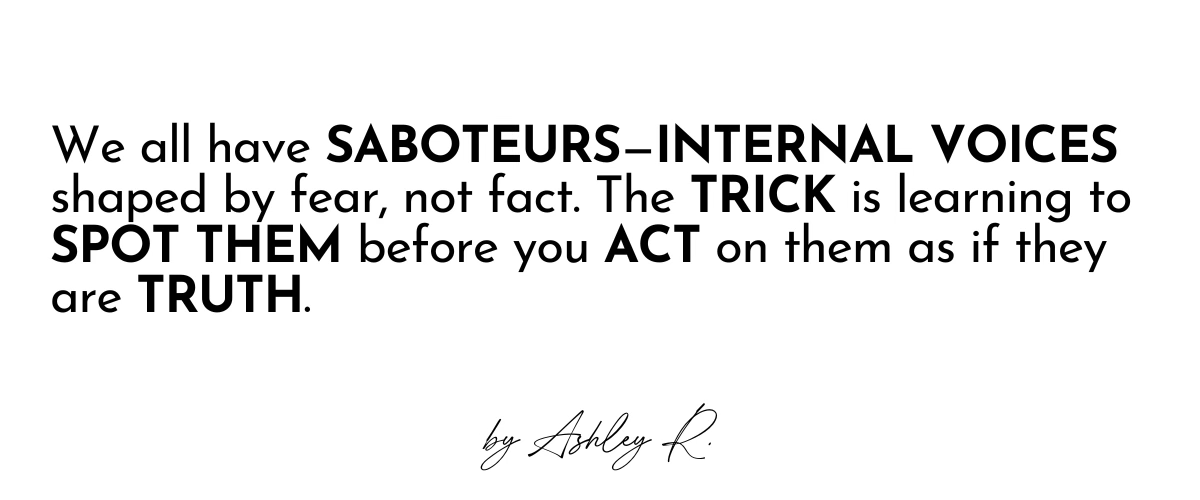Saboteurs in the City
Sex and the City meets self-sabotage: A pop-culture breakdown of the mental patterns that hold us back.
Welcome to this week’s edition of Reframed by Ashley R. I write for high achieving professionals who rarely get the space to think through what they want next or how to lead in a way that actually works for them.
I'm Ashley Rudolph—a former tech executive turned coach for leaders and next-gen execs in the creative, tech, and lifestyle industries.
I’m always on the hunt for fun ways to examine business frameworks. Unless you’re really into professional development, most frameworks aren’t that exciting and that makes them difficult to incorporate them in your day to day. My trick for absorbing them is to either apply them to my own personal life or find pop culture examples, real or imagined, that make them stick.
A few months ago, a colleague of mine, Jess Wass, introduced me to the Saboteurs framework. I found it incredibly helpful for analyzing my daily behaviors, particularly in moments when I’m under stress. Being able to say to myself, “do I really feel this way?” or “is my hyper-achiever saboteur getting in the way of my ability to take action?” has gotten me out of bed on time, has made me press send on an email or text I’ve been putting off, and has helped me take risks and be more bold in times when I was second guessing myself.
AN IMPORTANT REFRAME →
In short, understanding my saboteurs felt like a huge life hack.
That said, I’m not here to air out all my dirty laundry this week 🤣 - so let’s talk about the Saboteurs framework in the context of Sex and the City because Samantha, Carrie, Charlotte, and Miranda are constantly falling victim to theirs. I’m practically an expert on this topic — I’ve listened to the podcasts, read the blogs back in the day, and watched the (underwhelming but mildly entertaining) …And Just Like That reboot. So friends, I’m excited to put my years of aimless watching to good use.
What are Saboteurs?
Before we deep dive on #thegirls - most of you are probably wondering what the heck a “saboteur” is. The Saboteurs framework and assessment and the Positive Intelligence framework and assessment were both developed by Shirzad Chamine.
AN INTRODUCTION TO SABOTEURS →
Saboteurs are the voices in your head that generate negative emotions in the way you handle life’s everyday challenges. They represent automated patterns in your mind for how to think, feel, and respond. They cause all of your stress, anxiety, self-doubt, frustration, restlessness, and unhappiness. They sabotage your performance, wellbeing, and relationships.
In short, the more deeply you understand the origins of your negative self-talk, the easier it will be to not be consumed by it, to change your behaviors, and to ultimately rebound from it. There are 9 saboteurs and the names are fairly self explanatory: Avoider, Controllers, Hyper-Achiever, Hyper-Rational, Hyper-Vigilant, (People) Pleaser, Restless, Stickler, and Victim.
If don’t mind feeling a little exposed or called out (🤣), you can find out what yours are by taking the assessment.
Why Should You Care About Understanding Your Saboteurs?
Negative self-talk is a limiting behavior. If you remember my previous post, my word for this year is opportunity and negative self-talk directly limits your ability to be open to new opportunities. We don’t have time for that this year friends :) If you don’t believe me, here’s the research:
THE ROOT OF STRESS & ANXIETY →
The human mind is not hardwired for so much uncertainty & stress. We therefore often find our mind sabotaging our success & happiness. Automatic, unproductive mental patterns (called as “Saboteurs” in the Positive Intelligence Framework) are responsible for most of the stress & anxiety we experience.
Earlier on in my career and prior to discovering the Saboteurs framework, I praised myself for being highly self-critical. I thought it made me self-aware and that it pushed me to be better but turns out, that’s untrue.
AN ALTERNATIVE POV ON SELF CRITICISM →
Although some may argue that negative self-talk can challenge us to try harder - scientific evidence has proven that it has detrimental impact on our motivation, excessively increasing our levels of stress, anxiety and depression as well as decreasing self-esteem, cognitive processes, creativity and academic or professional performance.
Eye opening isn’t it?
The Saboteurs and Our Favorite Four
Now that we’re all on the same page about what Saboteurs are and why they’re important, I’ll be deep diving on the Pleaser, Avoider, Restless, Hyper-Rational, Stickler, and Controller archetypes because, in my professional opinion, these are the archetypes that stand out the most to me in the context of who Carrie, Charlotte, Miranda, and Samatha are in the show. Let’s have a little fun!
Carrie — The Pleaser and The Avoider
Carrie Bradshaw. Simultaneously loved and hated by many. Mildly annoying. Perfectly imperfect. An icon. She’s the reason why a generation of young girls set their sights on living in the big city in search of labels and love. When I rewatch episodes, I see Carrie’s People Pleaser and Avoider saboteurs on full display. Pleasers put the needs of others ahead of their own and feel the need to rescue others. Avoiders think if they let things go (by not addressing them), their issues will take care of themselves. Spoiler alert: they do not!!
If either of these resonate with you, here’s how to calm your inner Carrie at work. Let’s say you are constantly over capacity at work, are feeling stretched thin, and as a result are starting to feel burned out.
Your Pleaser Saboteur might say: I can’t speak up, doing so will disappoint my manager or my colleagues. My manager sees that I’m doing all this extra stuff, they just don’t appreciate me.
Your Avoider Saboteur might say: just suck it up and get through it. If I just deal with I won’t be stretched thin eventually. My manager will see that I’m burned out and they’ll fix it for me, if they don’t, this place just doesn’t value me.
Don’t listen! Do this instead: re-assess your work commitments. Identify 1 thing that you can either remove from your plate or push the due date back (you might even find 2 or 3, but starting we’re taking baby steps and starting with one so that we don’t panic your Pleaser or Avoider Saboteurs). Take that one thing and your recommendation for what to do about it (stop doing it or push back the deadline) to your manager. Ask them if they’re okay with it and engage in a dialogue.
WORK WITH ME
→ Ready for a smarter strategy behind your next move?
That’s the work we do inside Elevate — a one-on-one coaching experience for high performers navigating career pivots, leadership growth, or defining what’s next.
Samantha — The Restless and The Hyper-Rational
The original Sex and the City franchise would be nothing without Samantha Jones. Her sense of humor, her candor, her sense of style, her unwavering support of her friends. We could all learn a thing or two from Samantha — and we did. When I re-watch the franchise, I see her Restless and Hyper-Rational saboteurs jumping out at me. The Restless is constantly in search of greater excitement in the next activity (or suitor 😉). They’re rarely at peace or content. The Hyper-Rational are private and don’t let many people into their deeper feelings. They mostly show feelings through passion (in ideas). They prefer to just watch the craziness around them and analyze from a distance. If you’re familiar with the show, I probably don’t need to explain why and how Samantha fits the bill.
If either of these are relatable, here’s how to calm your inner Samatha at work. Let’s stick with the previous example of being over capacity at work.
Your Restless Saboteur might say: A new role is the solution to my problems. I’m over capacity and getting a new job would solve my problems. There’s too much to do here and my life would be easier if I just had a new job.
Your Hyper-Rational Saboteur might say: I’m able to take on all this work and my colleagues aren’t doing half as much. They’re focused on their feelings or things that aren’t important while I’m focused on getting work done. Because they’re not doing as much as me, I’m the one stuck with all the extra work. They’re making a big deal out of nothing — I’m the only one who cares about the facts. This might not be the place for me.
Don’t listen! Do this instead.
If you’re Restless: you have to deal with the fact that life (and work) isn’t full of fun and excitement all the time. Sometimes things will be difficult, challenging, or down right annoying and the solution isn’t always to jump ship. You have more control than you think you do, you can make being over capacity a temporary problem if you speak up. Focus on the issue (being over-capacity) and solve it by working with your manager to take something off your plate.
If you’re Hyper-Rational: this might feel counter-intuitive, but the best thing to do is to find ways to connect with your colleagues. Listen to their feelings and connect with yours. Feelings are good! Next, focus on taking steps to solve your capacity issue. Resist the urge to compare yourself to others as you advocate for taking things off your plate, focus on you.
Charlotte — The Stickler
Charlotte York. Famously on a quest for her perfect happy ending. She’s an idealist and a romantic. She believes in the power of love and would do anything to find it. She can also sometimes be blinded by pedigree and her checklists.
Sticklers are punctual, methodical, and perfectionists. They think that right is right and wrong is wrong. They prefer to not do things at all if they don’t think they can do a task perfectly. They are highly methodical and organized in order to always get things get done.
If this sounds like you, here’s how to tame your inner Charlotte at work. You know the drill, same example.
Your Stickler might say: I shouldn’t be over-capacity at work. It’s not how work should be but I’m obligated to do all this work now that it’s on my plate. You know what, I’m going to find a way to get it all done perfectly. I can organize my way out of this so that no one knows that I’m feeling overwhelmed. Feeling overwhelmed is wrong. When I finish all my work, people will praise me for handling it all so well.
Don’t listen! Do this instead.
For my Sticklers out there, you don’t have to do it all! You can try to advocate for yourself (understanding that sometimes, depending on industry, that’s not an option) and re-prioritize your work, getting the important things done first and pushing the less important things further down on your to do list. Getting everything done at the expense of your own mental health and well-being isn’t sustainable long-term. If you’re over capacity in the short-term, powering through it may be a fine solution, but if you’re constantly in this boat and feel like you have to be — there’s an opportunity to take a step back and check in with yourself: What would truly make you happy?
Miranda — The Controller and The Hyper-Rational
I chuckled in Season 2, episode 3 when Carrie said “Miranda, you are judgmental. Why don’t you put it to good use?” Miranda’s judge is constantly activated by the people and men in her life. In my opinion, Miranda’s saboteurs are the controller and the hyper-rational. Controllers either feel in control or out of control. They believe that if they work hard enough they can control the outcome in any situation. They believe that others want and need them to take control. Controllers are often surprised that others sometimes get hurt by their proclivity to take control. They can also be intimidating. Meanwhile, the Hyper-Rational are private and don’t let many people into their deeper feelings. They mostly show feelings through passion (in ideas). They prefer to just watch the craziness around them and analyze from a distance.
If either of these resonate with you, here’s how to tame your inner Miranda at work. You know the drill, same example.
Your Controller Saboteur might say: The only way to solve feeling over-capacity is to get all of this work done and off my plate. No one else can help me with this and getting all this work done is the only solution to my problems, so I need to take charge in all upcoming meetings and decisions related to my workload.
Your Hyper-Rational Saboteur might say: I’m able to take on all this work and my colleagues are complaining about burnout but they’re not doing half as much. They’re focused on their feelings while I’m focused on getting work done and because they’re not doing as much as me, I’m stuck with all the extra work. They’re making a big deal out of nothing — I’m the only one who cares about the facts. I’m convinced this is just not the place for me.
Don’t listen! Do this instead.
If you’re a Controller: first off, take a deep breath. Control is a high-anxiety response, if you don’t have a mechanism for centering yourself (meditation, breath work, a comfort show, upbeat music, etc), take 10 minutes to write down a list of activities or exercises that make you feel good (think: upbeat music, meditation exercises, breath work, a short walk, a piece of chocolate!!). When your Controller is activated, resist the urge to take action. Instead, choose an activity, treat, or exercise from your list. Next, ask yourself why do you think taking charge of the situation is the best next step? Do you have to do it? Do you want to do it? Can you take this as an opportunity to practice empowering others instead?
If you’re Hyper-Rational: this might feel counter-intuitive, but the best thing to do is to find ways to connect with your colleagues. Listen to their feelings and connect with yours. Feelings are good! Next, focus on taking steps to solve your capacity issue. Resist the urge to compare yourself to others as you’re advocating, focus on you.
Whew — that was fun! All of these Saboteurs are just perspectives, don’t read any of the above as wrong. Saboteurs are meant to protect you when you’re in a reactive mode. The point is that you should actively check in with them, the sensations surrounding them, how they make you feel, and whether they’re objectively true — then act.
If you haven’t done so yet, I encourage you to find out what your Saboteurs are by taking the assessment. Let me know what yours are in the comments and what thoughts/feelings came up for you in the comments below.
Good luck!! See you next week.
Ashley
SUBSCRIBE
→ Already subscribed? You’re in good company.
My readers work at places like A24, DoorDash, IDEO, Disney, and Harvard — and they’re all here for the same reason: to lead with more clarity, confidence, and intention.
If you’re not subscribed, click the subscribe button below.





